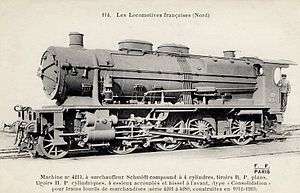Nord 4.061 to 4.340
|
Nord 4.213 (Schneider 3214 of 1913) | |||||||||||||||||||||||||||||||||||||||||||||||||||||
| |||||||||||||||||||||||||||||||||||||||||||||||||||||
| |||||||||||||||||||||||||||||||||||||||||||||||||||||
| |||||||||||||||||||||||||||||||||||||||||||||||||||||
| |||||||||||||||||||||||||||||||||||||||||||||||||||||
Nord 4.061 to 4.340 were a class of 2-8-0 tender goods locomotives of the Chemins de fer du Nord. At nationalisation on 1 January 1938 they all passed to the SNCF who renumbered them 2-140.A.1 to 2-140.A.280.
Origins
Faced with increasing heavy goods trains, the Chemins de fer du Nord decided to replace the 3.078 to 3.354 series mixed traffic 4-6-0s (later SNCF 2-230.A) with more powerful locomotives: the 4.000 series 2-8-0s (later SNCF 2.140.A) and the 5.000 series 2-10-0s (later SNCF 2-150.A). Designed as heavy goods locomotives, the class gained the nickname of “les Bœufs” (“Oxen”).
The design used the same boiler as the Nord's first 4-6-2 Pacifics, the 3.1150 series; they had Belpaire fireboxes, a steam dome on the first boiler ring, and a sandbox on the second. The boiler has 90 Serve tubes, and a 24-element Schmidt superheater. They were fitted with Nord's variable exhaust. While they were delivered with vacuum brakes, they were all retro-fitted with Westinghouse air brakes, the compressor being sited on the left-hand side.
Thirty-five identical locomotives were built for the Nord-Belge, numbered 421 to 455, they passed to the SNCB as type 48, and were renumbered 4821 to 4855, and later renumbered again as 48.001 to 48.035. They had been built by John Cockerill et Cie between 1927 and 1931.
Construction history
Construction of the locomotives was let out to various French manufacturers between 1912 and 1929.[1]
| Nord Nos. | SNCF Nos. | Manufacturer | Works Nos. | Year made | Notes |
|---|---|---|---|---|---|
| 4.061 – 4.160 | 2-140.A.1 – 2-140.A.100 | Société française de constructions mécaniques | 3717–3816 | 1921 | Ordered by the Ministry of Public Works in 1919.[2] |
| 4.161 – 4.170 | 2-140.A.101 – 2-140.A.110 | Nord's La Chapelle Workshops | — | 1913 | |
| 4.171 – 4.200 | 2-140.A.111 – 2-140.A.140 | Société française de constructions mécaniques | 3414–3443 | 1913 | |
| 4.201 – 4.240 | 2-140.A.141 – 2-140.A.180 | Schneider et Cie. | 3202–3241 | 1912–13 | |
| 4.241 – 4.260 | 2-140.A.181 – 2-140.A.200 | Société des Batignolles | 1862–1881 | 1912 | |
| 4.261 – 4.280 | 2-140.A.201 – 2-140.A.220 | Schneider et Cie. | 3242–3261 | 1913 | |
| 4.281 – 4.300 | 2-140.A.221 – 2-140.A.240 | Société Franco-Belge | 2028–2047 | 1912 | |
| 4.301 – 4.315 | 2-140.A.241 – 2-140.A.255 | Société française de constructions mécaniques | 4032–4046 | 1927 | |
| 4.316 – 4.330 | 2-140.A.256 – 2-140.A.270 | Société Franco-Belge | 2534–2548 | 1927 | |
| 4.331 – 4.340 | 2-140.A.271 – 2-140.A.280 | Société Alsacienne de Constructions Mécaniques | 7478–7487 | 1928 | Graffenstaden Works |
Service history
They were allocated to various Nord depots, including La Chapelle. They were used in coal train service between Lens and Le Bourget. During World War I, they were also used on troop trains, and after the war they were also used on passenger trains.[3]
Several locomotives were refitted with Lemaître exhausts;[4] this increased the power output by 100 horsepower (75 kW) due to reduced back-pressure.[5]
Tenders
During the course of the service, they were coupled to several different types of tender:
- 17.A (3-axle) – the original tender with a capacity of 17,000 litres (3,700 imp gal; 4,500 US gal) of water and ?? tonnes of coal. This short tender allowed the use of 18-metre turntables until 1925.
- 19.A (3-axle) – 19,000 litres (4,200 imp gal; 5,000 US gal) of water and 4 tonnes (3.9 long tons; 4.4 short tons) of coal.
- 22.A were rebuilt from the tenders of Pershing 2-8-0s. They has a capacity of 22,000 litres (4,800 imp gal; 5,800 US gal) of water and ?? tonnes of coal.
- 24.A (bogie) were also ex rebuilt from Pershing 2-8-0 tenders – 24,000 litres (5,300 imp gal; 6,300 US gal) of water and ?? tonnes of coal.
- 31.A (bogie) were of Prussian origin, and had a capcity of 31,500 litres (6,900 imp gal; 8,300 US gal) of water and 7 tonnes (6.9 long tons; 7.7 short tons) of coal.
- 34.A (bogie) were former 31.A tenders modified to carry 34,000 litres (7,500 imp gal; 9,000 US gal) of water and ?? tonnes of coal.
There were also occasionally attached to other tender types such as the 15.A, 23.A, 32.P, 37.A (from withdrawn Nord Atlantics 2.641 to 2.675) and 38.A.
Prervation
.jpg)
Only 140.A.259 has been preserved, without its tender; it is in the collection of the Cité du train in Mulhouse. It is displayed on its side to evoke the acts of sabotage performed by railwaymen at the time of the Resistance.[6]
Models
An HO scale etched brass and white metal kit of the Nord 4.061-series is available from the British manufacturer DJH Model Loco.[7]
An HO scale kit of the SNCB type 48 has been offered by Belgian manufacturer Jocadis, based on the DJH kit.
References
| Wikimedia Commons has media related to Nord 4.061 – 4.340 → SNCF 2-140.A. |
- ↑ Davies 1997, pp. 114–118.
- ↑ Davies 1997, p. 114.
- ↑ Davies 1997, p. 118.
- ↑ Ledard (September 1936). "Perfectionnements apportés par la Compagnie du chemin de fer du Nord aux échappements de ses locomotives". Revue Générale des Chemins de Fer (in French).
- ↑ Davies 1997, p. 96.
- ↑ "140A259". Cité du Train.
- ↑ ""E104 - 140A SNCF/NORD 'le Bœuf' Tender 23A"". DJH Model Loco. Retrieved 1 October 2016.
- Davies, John (January 1997). Chemins de fer du Nord Locomotive List 1842–1938. Sunnybank, Queensland: Dr. John Davies. ISBN 0-646-30938-2.
